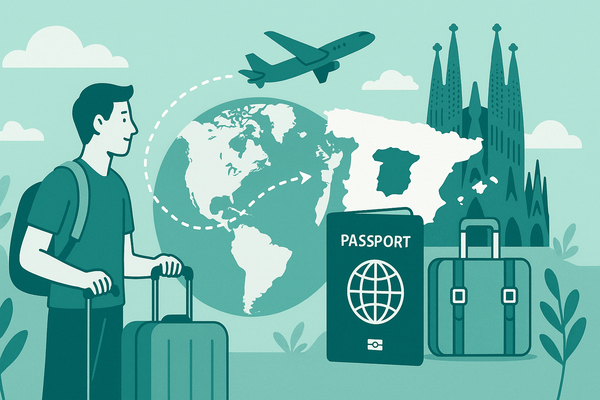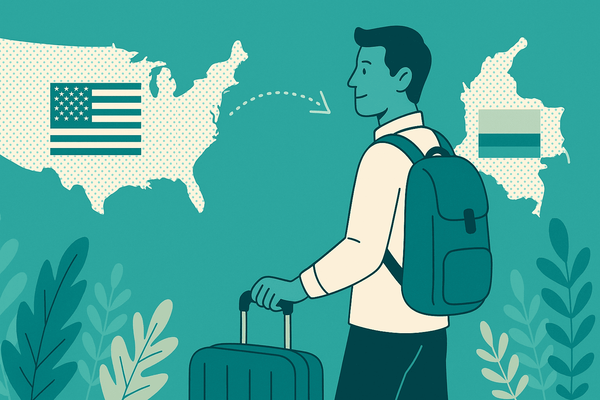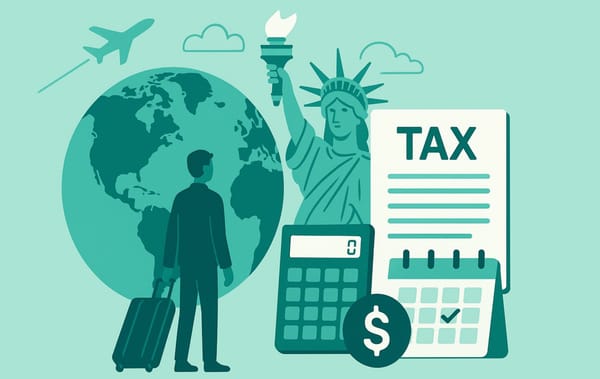Best and worst U.S. domicile states for American nomads

For American nomads, choosing the right state to keep as your domicile is essential to minimizing tax obligations and ensuring compliance. Establishing domicile in a carefully selected state can save you thousands of dollars each year and simplify bureaucratic headaches.
Key factors:
- State Income Tax: Some states have no income tax, while others impose substantial taxes on income, including worldwide earnings.
- Residency Requirements: The ease of establishing and maintaining residency varies widely across states.
- Foreign Earned Income Exclusion (FEIE): Only a few states allow nomads to benefit from federal tax exclusions, which can reduce tax burdens.
- Physical Presence Requirements: Frequent travelers need to consider states with minimal physical presence obligations.
Group 1: Easy residency, zero-state income tax
These states offer the best balance for nomads by having no state income tax and minimal residency requirements. They are ideal for digital nomads, nomads, and frequent travelers looking to reduce their tax burden without being tied to a specific location.
Based on our experience and research, Florida and South Dakota are the best states for nomads, because of their straightforward residency requirements and zero-state income tax policies.
#1 Florida
Florida is one of the most popular domicile states for nomads because it has no state income tax, minimal residency requirements, and strong asset protection laws. Additionally, obtaining a Florida driver's license is essential for establishing domicile and fulfilling various legal responsibilities. Florida’s proximity to major international airports makes it convenient for frequent travelers.
Key benefits:
- No state income tax on worldwide earnings.
- Vehicle registration can be done without the car being in the state.
- Strong asset protection laws.
- Friendly domicile services like SavvyNomad can help establish residency.
- Close to major cities and international travel hubs, beneficial for frequent travelers.
Drawbacks:
- Residential address requirement: Nomads must have a permanent address, which can be mitigated by using professional domicile services.
- Initial vehicle inspection: Although this is required, it can be completed out of state, making it less of a hassle.


#2 South Dakota
Establishing a domicile in South Dakota is a popular choice for many nomads. It is important to have a legal address in South Dakota for establishing domicile, which is crucial for tax obligations, voting, and obtaining essential documents.
Key benefits:
- No state income tax, providing significant savings on all income.
- Easy vehicle registration process that can be completed online.
- Minimal bureaucratic requirements make it ideal for nomads and travelers.
Drawbacks:
- Recent legislative changes: In 2023, South Dakota increased the physical presence requirement and restricted the use of personal mail boxes for voting and payroll purposes.
- Voting restrictions: You need a residential address to vote.
- Payroll tax complications: Personal mail boxes cannot be used for payroll taxes, affecting W-2 employees.
- Less RV-friendly: Recent policy changes have made the state less accommodating for RVers.
- Physical presence requirement: Requires proof of at least one overnight stay in the state every 5 years to renew a South Dakota driver’s license.

Group 2: Moderate residency requirements, zero-state income tax
In this group, we have states that offer no state income tax, but they come with more stringent residency requirements or other complications that might make them less ideal for digital nomads.
These states can still be a good choice depending on individual circumstances, but they might not offer the same level of flexibility as Florida and South Dakota.
Establishing a new domicile in these states involves significant steps, including updating address details with various institutions and taking legal steps to demonstrate commitment to the new location.
States:
Texas
Establishing a domicile in Texas is a popular choice for nomads due to the absence of state income tax. Additionally, maintaining voter registration is a crucial requirement for establishing domicile in Texas, as it helps fulfill various legal and administrative obligations.
Key benefits:
- No state income tax, allowing for substantial savings.
- Access to major international airports for easy global travel.
- Broad range of ACA-compliant health insurance options, important for maintaining coverage while abroad.
Drawbacks:
- Car registration: The vehicle must be in the state for a safety check.
- 30-day residency requirement: Must be in the state for 30 days before getting a state ID or driver’s license.
- Annual vehicle inspections: Every vehicle registered in Texas requires an annual safety inspection.
- Residential address required: Must have a livable address for residency, which can be restrictive for nomads.

Nevada
Nevada is another state with no income tax, which makes it attractive for nomads. Establishing a domicile in Nevada is made easier with mail forwarding services, which are crucial for managing important documents like tax papers and vehicle registrations while traveling.
It has relatively simple residency requirements and broad health insurance options, which is a bonus for those looking to maintain U.S.-based coverage while abroad.
Key benefits:
- No state income tax: Substantial financial benefits.
- Access to international airports: Extensive options, beneficial for frequent travelers.
- Health insurance options: Broad range of ACA-compliant options.
- Driver’s license renewal: Every 7 years.
Drawbacks:
- 30-day stay requirement: Must show a 30-day consecutive stay in the state for residency.
- Annual smog checks: Required for vehicle registration, particularly in populous counties like Clark County.
- Car registration: Vehicle must be in state for smog check (for most counties).
- Residential address required: Must have a livable address for residency.

Wyoming
Wyoming also has no state income tax and is generally friendly toward nomads and nomads. Legal documents are essential for establishing domicile in Wyoming, ensuring proper legal and tax obligations are met.
However, the lack of major international airports and the need for a livable address make it less convenient than other states.
Key benefits:
- No state income tax: Financially beneficial for all income levels.
- Access to international airports: Limited access, but adequate for occasional travel.
- Health insurance options: Broad range of ACA-compliant options.
- Car registration: VIN inspection required (can be done by local law enforcement).
- Driver’s license renewal: Every 10 years.
Drawbacks:
- Residency challenges: Obtaining a residential street address can be difficult.
- Residential address required: Must have a livable address for residency.
Washington
Washington is another no-income-tax state with broad health insurance options and major international airports, making it an appealing option for nomads. However, residency requirements are more stringent than in some other states.
Key benefits:
- No state income tax: Saves money on all types of income.
- Access to international airports: Extensive options, beneficial for frequent travelers.
- Health insurance options: Broad range of ACA-compliant options.
- Driver’s license renewal: Every 7 years.
Drawbacks:
- Residency establishment: Requires substantial physical presence to prove residency.
- Vehicle inspections: Periodic emissions testing required in some areas.
- Car registration: Vehicle must be in state for smog check (for most counties).
- Residential address required: Must have a livable address for residency (no personal mail boxes).
Group 3: No tax on worldwide income for non-residents
Some states offer unique advantages by not taxing global income for non-residents. This can be a beneficial option for American nomads who are able to maintain non-resident status in their domicile state. Understanding federal taxes is also crucial, as U.S. citizens are subject to federal taxes on their worldwide income, regardless of their location.
These states allow significant tax savings, making them appealing to nomads who can legally establish themselves as non-residents, thereby avoiding state income tax altogether.
If you are from one of these states or it was your last state of residency, you might not need to take additional steps to maintain your domicile status.
However, if you were not previously a resident, it may be more beneficial to explore states listed in Group 1 or Group 2 of this article.
States:
- Colorado
- Connecticut
- Delaware
- Massachusetts
- Minnesota
- Missouri
- North Dakota
- Oregon
- Pennsylvania
- Virginia
- West Virginia
Key characteristics:
- No tax on worldwide income for non-residents: Significant financial savings for nomads.
- Favorable residency requirements: Easier to establish non-resident status compared to other states.
- Potential for significant tax savings: By not paying state taxes on global earnings, nomads can maximize their available incomes.
Key benefits:
- Financial Benefits: These states provide significant tax savings by not taxing non-residents on income earned globally.
- Residency Maintenance: Minimal requirements to maintain non-residency status, making it easier for nomads to manage their tax obligations.
- Health Insurance Options: Many states in this group offer a broad range of ACA-compliant health insurance options, ensuring nomads can access necessary healthcare services.
Drawbacks:
- Residential Address Requirements: All states in this group require a livable address, which may be restrictive for some nomads and nomads.
- Vehicle Registration: Periodic inspections and the need for a local address can be cumbersome for those frequently abroad. Some states require emissions or safety checks, adding to the maintenance burden.
Group 4: Worldwide income tax for domiciles with a Foreign Earned Income Exclusion
Some states tax worldwide income for residents but allow nomads to exclude a portion of their foreign-earned income, which can reduce their tax burden. The Foreign Earned Income Exclusion (FEIE) allows nomads to exclude up to $126,500 of their foreign-earned income from state taxes for the 2024 tax year.
This can be a substantial benefit for those earning abroad, though it is still less advantageous compared to states with no income tax at all.
It is important to understand the role of tax authorities in determining tax obligations for nomads, as they conduct residency audits and require proper documentation to establish one's domicile.
Key characteristics:
- Worldwide income taxation: These states tax their residents on income earned globally .
- Foreign Earned Income Exclusion (FEIE): Allows nomads to exclude a portion of their foreign-earned income from state taxes, up to $126,500 for the 2024 tax year.
- Potential for tax savings: nomads can significantly reduce their taxable income through the FEIE.
States:
- Alabama
- Arizona
- Georgia
- Idaho
- Illinois
- Indiana
- Iowa
- Kansas
- Kentucky
- Maine
- Michigan
- Ohio
- Oklahoma
- Rhode Island
- South Carolina
- Utah
- Vermont
Key benefits:
- Foreign Earned Income Exclusion: These states allow nomads to exclude a substantial amount of foreign-earned income from their income subject to state income taxes, reducing the overall state tax liability for nomads.
- Potential Tax Reductions: While these states tax worldwide income, the FEIE can exclude a large portion of foreign-earned income from being taxed, reducing the overall tax burden.
Drawbacks:
- Worldwide income taxation: Residents are taxed on their global incomes, which can result in higher tax liabilities compared to states with no income tax.
- Complex tax filing requirements: Navigating state tax laws can be complex and may require professional assistance, at a cost.
- Exclusion Limit: The foreign earned income exclusion is limited to $126,500 for the 2024 tax year and applies only to earned income. Other types of income, such as interest and capital gains, are still subject to state taxes.
Group 5: Worldwide income tax for domiciles without Foreign Earned Income Exclusion
This group represents the most unfavorable states for American nomads. These states tax worldwide income for their residents and do not offer any form of relief, such as the Foreign Earned Income Exclusion (FEIE).
If you are domiciled in one of these states, you could face significant tax liabilities on income earned abroad, with no way to reduce the burden through exclusions or credits.
Key characteristics:
- Worldwide income taxation: These states tax their residents on income earned globally .
- No Foreign Earned Income Exclusion (FEIE): No provisions for excluding foreign-earned income from state taxes.
- High tax liability: nomads cannot reduce their taxable income through the FEIE, resulting in higher overall tax liabilities.
States:
- Arkansas
- Indiana
- Kentucky
- Louisiana
- Maine
- Maryland
- Mississippi
- Montana
- Nebraska
- New Mexico
- North Carolina
- Wisconsin
Drawbacks:
- Worldwide income taxation: Residents are taxed on global income, which can result in significantly higher tax liabilities.
- No FEIE: Without the foreign-earned income exclusion, nomads face higher taxes on their foreign earned income.
- Complex tax filing requirements: Navigating state tax laws without the benefit of FEIE can be complex and may require professional assistance, at some expense.
Impact on nomads:
- High tax burden: nomads domiciled in these states will face higher tax liabilities on their worldwide income.
- Need for professional assistance: Due to the complexity and potential high cost of compliance, nomads may need professional help to manage their tax obligations effectively.
Group 6: Worst possible states for nomads
This group represents the absolute worst states for American nomads in terms of taxes. These states combine high state income tax rates with taxation on worldwide income, and they do not offer any meaningful exclusions or credits for foreign-earned income.
If you are a digital nomad domiciled in one of these states, you are likely paying significantly more in taxes than you would in a more tax-friendly state. Additionally, the impact of death taxes can further complicate your financial situation, as your declared domicile may lead to significant estate tax liabilities.
If you are domiciled in one of these states, consider moving your domicile to a state in Group 1 or Group 2.
Because you do not spend time in these high-tax states, you are essentially paying for infrastructure and services that you do not use. Changing your domicile to a state with no income tax or more favorable tax policies can produce substantial financial savings and simplify your tax compliance.
States:
Key characteristics:
- Highest state tax rates: These states have some of the highest state income tax rates in the country.
- Worldwide income taxation: Residents are taxed on their global incomes with no exclusions.
- Complex tax regulations: These states have detailed and complicated tax filing requirements that can be challenging to navigate.
California
- High State Income Tax: California has one of the highest state income tax rates, reaching up to 13.3%.
- Worldwide Income Taxation: All income earned globally is taxed with no exclusions.
- Complex Compliance: Detailed tax laws and regulations require extensive documentation and may necessitate professional tax assistance.
Hawaii
- High State Income Tax: Hawaii’s state income tax rates can go up to 11%.
- Worldwide Income Taxation: Residents are taxed on their global incomes with no exclusions.
- Complex Compliance: Hawaii’s tax laws and regulations are intricate, requiring careful planning and, often, professional assistance to navigate.
New Jersey
- High State Income Tax: New Jersey’s state income tax rates can go up to 10.75%.
- Worldwide Income Taxation: All income earned globally is taxed, with no exclusions.
- Challenging Compliance: Tax filing in New Jersey is known for its complexity, often requiring professional help to navigate the regulations.
New York
- High State Income Tax: New York’s state income tax rates can reach up to 10.9%, and when combined with New York City taxes, the total rate can go as high as 14.776%.
- Worldwide Income Taxation: All income earned globally is taxed with no exclusions.
- Complex Filing Requirements: New York’s tax laws are intricate and compliance can be difficult without professional assistance.
Drawbacks:
- High Tax Burden: nomads domiciled in these states face significantly higher tax liabilities on their worldwide incomes.
- No FEIE: These states do not provide a foreign-earned income exclusion, resulting in no relief for nomads from high tax burdens on foreign-earned income.
- Complicated Tax Filing: The tax filing process in these states is complex and can be challenging to manage, often requiring professional tax assistance.








